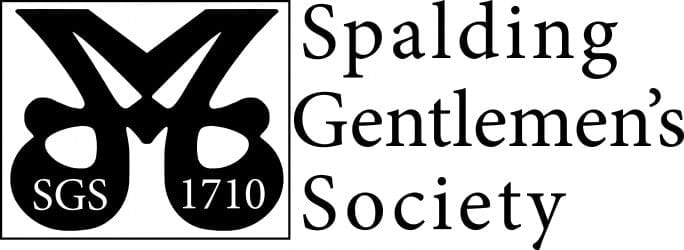A GRAND DAY OUT.
By Alastair Goodrum.
In this year of a General Election (2024), some photographs in the Society’s collection remind us of days gone by when Spalding returned its own MP.
A youthful Francis McLaren with his trusty Rolls-Royce outside Welland Hall, London Road, Spalding, during thewinter 1910 election campaign.
In a marvellous display of affection towards their young MP, Francis McLaren and Barbara Jekyll, his bride-to-be, one of the gifts for their forthcoming wedding: a silver tray, silver tea and coffee pots, sugar basin and cream jug – all bearing the Spalding coat of arms – was the result of donations from no less than 2,100 of his constituents. Not to be outdone, the Spalding Women’s Liberal Association contributed a case of twelve ivory-handled silver dessert knives and forks. Not only did these people raise a great deal of cash but a huge contingent of them also made the actual presentation to Francis and Barbara personally – and at Bodnant in North Wales, too! The Liberal Party Grand Day Out is a masterpiece of planning and execution that is a delight to savour in the light of modern-day rail logistics.
Before dawn on 6 July 1911, having gathered up travellers from every station on the local lines from Sutton Bridge to Spalding and from Freiston to Boston and beyond, three special trains carrying this jolly outing, puffed out of Spalding while two more departed from Boston, all bound for Crewe, changing point on the 200-mile cross-country journey that terminated in Llandudno, North Wales.
The train bearing the Liberal Lucky Horseshoe in Spalding station, bound for Wales.
Adorning the front of the Spalding contingent’s locomotive boiler was a large blue horseshoe, a memento from the Spalding Women’s Liberal Association that had been presented previously to Francis as a good luck charm for his 1910 election campaign. Changing trains at Crewe, the horseshoe was carefully transferred to the front of the new locomotive for the rest of the journey to Llandudno. The first train left Spalding station at 1.27 am and arrived at Llandudno at 7.25 am. In glorious sunshine, the travellers – far from being weary – enjoyed a few hours promenading along the Parade, the pier, the beach and climbing Great Orme Head to gaze in wonder at the panorama – a view quite strange to these Fenlanders. At 12.30 pm, while a few chose to spend their day at the seaside, the vast majority eagerly re-assembled at the station to make their way to Bodnant in three trains for the main event. Francis’s father, Sir Charles McLaren, had arranged that the trains would stop at a level crossing near the Hall, instead of going further down the line to Tal-y-Cafn. This enabled the party to have a leisurely stroll upwards through the magnificent gardens to the lawn in front of the Hall where they were greeted by Francis, his father and mother, his fiancée Barbara and his brother Henry Duncan McLaren MP.
In another prodigious feat of logistics, all were then entertained in marquees on the back lawns where two sittings of 950 people at a time were fed a sumptuous knife and fork tea, each sitting followed by a Pierrot show. At 4.00 pm everyone assembled on the lawn to witness the presentation ceremony and the fulsome speech of gift from Mr Philip J. White, made to the frequent accompaniment of loud ‘hear, hears’ and rousing cheers. Then, with the refrain of ‘For He’s a Jolly Good Fellow’ ringing in his ears, Francis rose to reply with grateful thanks on behalf of Barbara and himself. He took great pleasure in introducing Barbara who took to her feet to give her own, maiden, speech of thanks to the Association. Other speeches followed, in particular one by Mr William Dennis of Sutton Bridge, thanking Sir Charles and Lady McLaren for their magnificent hospitality, to which both Sir Charles and his wife replied in turn. There still remained time for the visitors to wander through the gardens and indeed through parts of the Hall itself, or listen to the Spalding Excelsior Band playing its light music repertoire on the lawn – the surface of which must have taken an awful beating. Finally, to the strains of a rousing march, the Spalding Band led the visitors down to the level crossing to board the trains back to Llandudno where those with energy remaining could complete their sight-seeing and board the late-evening train convoy back to Lincolnshire. The first train arrived back in Spalding station at 3.25 am the next morning.
Presentation of the wedding gifts from Spalding Liberals at Bodnant Hall in Wales.
The constituency committee must have had a logistical nightmare to organise five trains from far flung parts of South Holland. To be able to complete this particular journey by rail in a single day AND have nearly twelve hours to spend in North Wales, is a feat that could not be replicated by scheduled railway service in the twenty-first century. Neither could it be done for the price of seven shillings a ticket (35p ≈ £34 in 2024), compared to a ticket price of over £120 in 2024.
So successful was the trip to Bodnant in 1911 that the Spalding Liberal Association ‘away-day’ became an annual affair. In 1912 Aberystwyth was the destination and in 1913 the train trip to Scarborough attracted a record 2,500 constituents. 1914 saw a return to Llandudno, where Francis played a leading role in events during what became the final outing of its kind to be organised by the Spalding Liberal Association.
Francis McLaren MP married Barbara Jekyll on 20 July 1911 at St Margaret’s church, Westminster.


Leave a Reply
You must be logged in to post a comment.